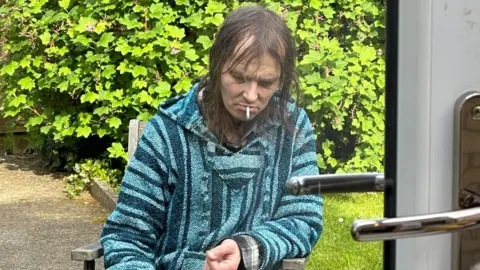A former prolific shoplifter who stole goods worth “tens of thousands” of pounds has told a BBC investigation how he regularly sold the items to other shops.
Ross, who has 15 convictions for shoplifting but has never been to prison, estimated he stole goods worth £300 every day, which he would then sell on to fund his crack cocaine and heroin addiction.
British Retail Consortium chief executive Helen Dickinson said there was an “increasing trend of unscrupulous businesses taking on local product that has been stolen to order”.
Ross, 39, told the BBC he had been clean of drugs for five months and was “ashamed” of his actions, which he blamed on the “desperation” of his addiction.
 Jim Connolly/BBC
Jim Connolly/BBCAs well as selling directly to shops across Leeds, Ross said he had also stolen to order for a so-called middle man, who would then sell on the goods.
He said perfume, cosmetics, alcohol and food were among the items he would regularly steal and sell on “as the cheapest wholesaler”.
“If I had a bag full of stuff, I would know which shop to go to,” said Ross.
“They’d take me into the back room, I’d lay it out on the floor and we would discuss a price.”
Ross’s most recent shoplifting conviction came in May, when he received a suspended sentence at Leeds Magistrates’ Court.
That hearing was told that Ross had stolen more than £4,000 worth of goods from Urban Outfitters in Leeds over a two-year period.
The store stopped displaying vinyl records on its shelves because of how often Ross was stealing them.
He claimed he would be a “gold medallist” if shoplifting was an Olympic sport, although he admitted there was “no justification for it”.
‘Customer pays’
Darren Bailey, who owns six pet supplies shops across Yorkshire, told the BBC investigation he had written off £5,000 worth of stock due to shoplifting over the last year.
“It’s a massive amount of money,” said the business owner of 15 years.
“That does have an effect on the way we run the business. We have to raise prices. The customer ultimately pays the price.”
The Centre for Retail Research has estimated that shoplifting added £133 onto the cost of an average household’s shopping bill each year.
Thieves even struck while the BBC was filming at one of Mr Bailey’s shops in Leeds.
Staff member Freya Thackray said: “People are getting away with these things and we just have to stand here and watch it happen over and over again.”
Some thieves could be armed, Ms Thackray added.
“It’s a risk whether to go after them or whether we just let them get away with it.”
Mr Bailey called for tougher punishments for shoplifters.
A West Yorkshire Police spokesperson said the force was “very much aware of the concerns of businesses and regularly reviews offences to identify patterns of offending and put robust plans in place to address them”.
‘All consuming’
The problem is seemingly nationwide.
In Truro, Cornwall, shop owner Martin Gaunt said his quirky gifts and collectibles store, Happy Piranha, was targeted by thieves on an almost daily basis.
He said he followed one thief and witnessed goods taken from his shop being sold on to another trader.
With 12 cameras in his shop, the task of trying to stop thieves had become “all consuming”, he said.
“I’m thinking about it when I go to sleep, I’m thinking about it when I wake up.”
Ch Insp Sarah Johns, from Devon and Cornwall Police, said: “We are aware that shoplifting is an offence which can hugely impact the livelihoods and well-being of businesses and their employees.
“We know how devastating this can be, especially if the business becomes a regular target – that’s why we continue to strive to connect with our local retailers.
She added that “several initiatives” were in place to combat shoplifting, and teams across Devon and Cornwall “work hard to build relations with local partners and use a range of measures, such as plain clothes operations and targeted days of action, to identify and deter prolific offenders”.

According to the Office for National Statistics, more than 430,000 shoplifting offences were recorded last year – the highest figure since current police records began in 2003.
Home Secretary Yvette Cooper has previously pledged to revoke 2014 legislation that meant “low-value” thefts worth under £200 were subject to less serious punishments.
Meanwhile, Ms Dickinson, from the British Retail Consortium, said a police crackdown on stealing to order was “absolutely vital” to stop the problem.
Ross, who confessed to being a drug user for more than 20 years, said: “You’re going out stealing, putting people at risk, making people feel on edge.”
“It’s needs must. There’s always a choice, but it felt like there was no choice,” he added.
 Miranda Arieh
Miranda AriehCriminology expert professor Emmeline Taylor from City, University of London said 70% of shoplifters were “just like Ross”.
“They are stealing to fund a drug addiction.”
Ross called for more support for people with drug and mental health issues, adding: “If I would have got help, it might have been a different life.”
He said he had shoplifted through “desperation” and “it just felt like a need”.
“It’s mental illness. It’s survival,” he said.
Ross added: “The life I was living wasn’t the life I wanted to live and it felt awful.”
Despite his convictions dating back as far as 2006, he said he was never offered drug treatment beyond a methadone prescription and voluntarily attending Narcotic Anonymous meetings.
A psychiatric report read out at his most recent court appearance said he was “highly likely” to have ADHD which, along with along with a “severely traumatic” early childhood, led to addiction.
Still, Ross said he never received any mental health support.
‘Comprehensive support’
In Leeds, the wait for an ADHD assessment is at least three years, with the backlog nationally as long as eight years.
Ross claimed his life spiralled out of control when he began taking crack and heroin together, resulting in his methadone prescription getting stronger.
That was a sign the authorities knew he had a growing problem and should have intervened, he said.
Ross put getting clean down to the intervention of an old friend after the death of a mutual friend.
A spokesperson for Leeds City Council said it offered “comprehensive support for addiction and the service is rated as Outstanding by the CQC”.
They added that 240 people had successfully exited treatment for opioid issues through the authority’s service, with more than 100 people sent to residential rehab funded by the council “when it is appropriate for them”.
“Our services are accessible to anyone in Leeds without a referral, and we collaborate with GPs, hospitals and social services to reach those at risk of falling through the cracks,” the spokesperson said.
“We continuously seek to improve our services based on feedback to better serve the community.”
Additional reporting by Gareth Shoulder.
Listen to highlights from West Yorkshire on BBC Sounds, catch up with the latest episode of Look North or tell us a story you think we should be covering here.

